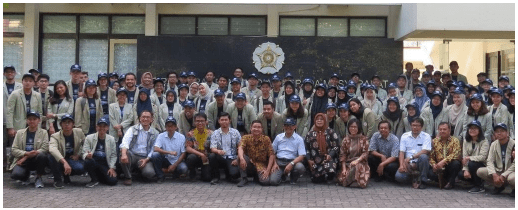
Universitas Gadjah Mada (UGM) was established on December 19, 1949 as a national university. Today, the university consists of 18 faculties, one postgraduate school, one vocational school, 263 study programs, 108 joint degrees/double degrees, and 21 research centers. The academic activities of Universitas Gadjah Mada are expressed in the form of the cornerstones of Tri Dharma higher educational values, which are Education and Teaching, Research, and Community Service.
As one of the oldest universities in Indonesia, UGM is known as a populist university due to its commitment in serving the society. Since 1951, UGM has deployed its students on the basis of conducting a Community Service Program. Within a decade, no less than 1218 students had been commissioned, resulting in 109 newly established high schools in areas outside Java Island (the most populated island of Indonesia). In 1971, based on the recommendation of UGM’s law expert, Prof. Koesnadi Hardjasoemantri, the program became a compulsory course for UGM undergraduate students. As a populist university, UGM has a moral obligation to maintain the sustainability of SCS program. In 1999, a thematic SCS program emerged as an alternative solution towards Indonesian monetary crisis of the preceding year. Since 2006, UGM shifted the program’s paradigm from community development into research-empowerment as a response towards the continuous globalization pressure on the Indonesian community. Thus, the program’s name changed into Student Community Services – Community Empowerment Learning (SCS-CEL).
Since then, UGM has deployed its students to nearly all the 34 provinces of Indonesia. The program now includes both Indonesian and international students, with a total of 32 universities from 15 countries also participating, including Norway, South Korea, Japan, Australia, Austria, France, Germany, etc. In 2016, SCS-CEL program was implemented in 33 provinces, 108 districts, 179 sub-districts, and 276 villages. Since its inception, UGM has dispatched more than 200,000 students to all provinces in Indonesia.
SCS-CEL program was developed to solve real problems faced by the community (thematic) through an inter-discipline or multi-discipline approach and local community empowerment. Therefore, this program sees the students working together with the local community and government. In a program created for problem solving, the students act as motivators, innovators, and facilitators for the assisted community. SCS-CEL program has to be developed based on the alignment of three pillars of sustainability, which comprises of economic, social, and environmental sustainability, and it will have a strategical meaning for the actualization of sustainable development by an academic community.
Based on UGM’s priority and research areas, the scope of SCS-CEL program is divided into several themes as follows:
- Socio-cultural development based on local wisdom and nationalism
- Community empowerment through education
- Women and vulnerable community empowerment
- Rural governance and administration
- Enhancement of law and political awareness
- Small and medium enterprises development
- Sustainable agricultural, fisheries, farming, and forestry production
- Natural resources development
- Environmental management
- Enhancement of community’s health
- Regional infrastructure development
- Renewable energy
- Information technology for sustainable development
- Disaster early warning system and mitigation
- Enhancement of national defense and security
- Eradication of illiteracy
SCS-CEL Program is held twice a year, one term held in between semesters and another term during the semester. The students are divided into teams consisting of a minimum of 20 people and a maximum of 30 people with 1 field lecturer assigned to each team. In order to solve real problems, each team has to consist of students from four clusters, which are Science-Technology, Social-Humanitarian, Medicine, and Agriculture. Those clusters covers all 18 faculties in UGM. During the implementation, the students are required to attend 72 hours of preparation courses, stay in the implemented location for two months, and fulfill 288 effective hours in order to complete their programs. For funding, SCS-CEL program is suported by involving stakeholders coming from communites, the government, industries, enterprises, and so forth. The partnership can be in the form of funding, service, and providing facilities. Before being deployed, UGM holds preparation courses regarding the history and philosophy of SCS-CEL, educating the students in sustainable development, administration, ethics, community empowerment, as well as occupational health and safety. Then, their comprehension is evaluated through a General Test (GT) that takes place after the course.
Source:
Utami, S. U., Budiarto, R., Prayitno, B., & Salis, F. R. (2019). Creating a sustainable well-being through UGM’s multi-discipline courses. Proceeding of the 5th International Workshop on UI Greenmetric.
![]()
![]()

![]()
![]()
![]()
![]()
![]()
![]()
![]()
![]()
![]()
![]()

